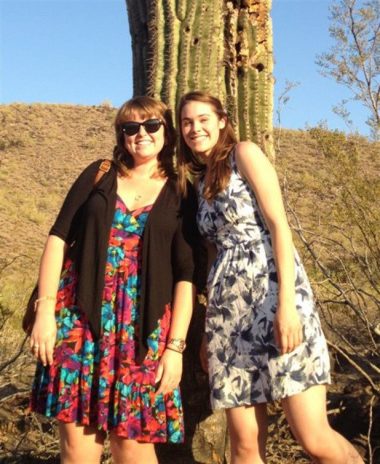A national reporting project on voting rights that two School of Communications students helped produce as part of their Carnegie-Knight News21 summer internship has received a 2012 EPPY Award from Editor & Publisher magazine.

The project, titled “Who Can Vote?”, is a multimedia investigative reporting initiative that was completed by 24 students from 11 universities across the country. Among the students were Elon Univeristy senior print/online journalism majors Caitlin O’Donnell and Kassondra Cloos, who spent the summer at Arizona State University’s Walter Cronkite School of Journalism and Mass Communication, where the project was produced.
“Who Can Vote?” won an EPPY in the category of best college/university investigative or documentary report. The winners will be featured in the December 2012 issue of Editor & Publisher.
According to a release from the Cronkite School, “The EPPY Awards, presented annually by Editor & Publisher, recognize the industry’s best media-affiliated websites across 31 diverse categories, including three honoring excellence in college and university journalism. Entries are judged by more than 60 industry experts on criteria such as design, ease of use, comprehensiveness, timeliness and interactivity.”
This was the first year Elon students have been eligible to participate in News21, which is funded by the Carnegie Corporation and the Knight Foundation. O’Donnell, Cloos and the other students began their work in spring seminar, during which time they comprehensively studied the topic of voting rights. Then, the 10-week reporting fellowship officially began in the summer.
According to the same Cronkite School release, “The fellows traveled to more than 40 cities, 21 states and one U.S. territory, conducted more than 1,000 interviews, requested thousands of public records and reviewed nearly 5,000 documents. Their most ambitious effort was to gather, organize and analyze all reported cases of election fraud in the U.S. since 2000, building the most comprehensive database of its kind.
“The finished project, launched just before the 2012 political conventions, consists of more than 20 in-depth reports and rich multimedia content that includes interactive databases and data visualizations, video profiles and photo galleries. Major media partners that have published all or part of the project include The Washington Post, nbcnews.com, National Public Radio, The Center for Public Integrity, The Philadelphia Inquirer, nonprofit investigative online sites affiliated with the Investigative News Network and New America Media, which represents ethnic media.”
The work the students produced was published on the web and offered free to partners under Creative Commons usage. Previous News21 projects have been picked up by media outlets across the country.
Past projects have included stories about food safety, health, religion, senior citizens, education and the economy. And this year, the News21 team worked under the direction of former Washington Post Executive Editor Len Downie.
O’Donnell, a Lumen Scholar in the Class of 2013 and a Communications Fellow, is the outgoing editor-in-chief of The Pendulum. Cloos spent the last year serving as an assistant producer on the Pendulum’s webcast “The Swing” and as a copy editor.
News21 launched in 2005 with five universities: the University of California-Berkeley, Columbia, Harvard, Northwestern and Southern California. Three years later, seven other schools were added, and this year, the initiative was open to all journalism programs.


